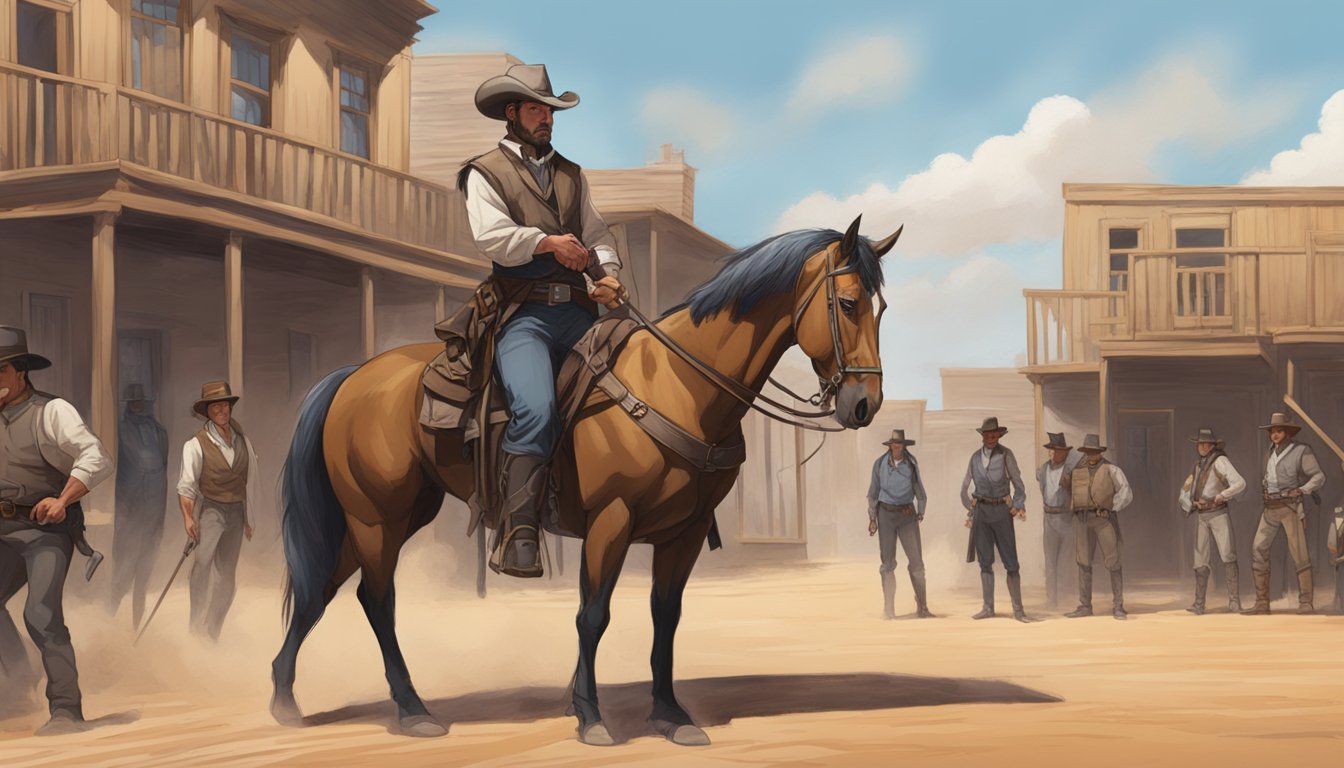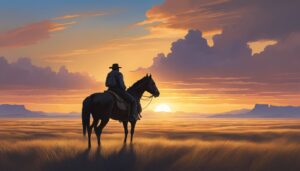Western heroes have captivated audiences for generations, with their rugged charm and unwavering moral codes. Two iconic figures stand out in this genre: John Dutton from the modern series “Yellowstone” and Paladin from the classic “Have Gun – Will Travel.” Both characters embody the essence of the Western hero, but in distinctly different ways.
John Dutton, portrayed by Kevin Costner, is the patriarch of a powerful ranching family in Montana. He fights to protect his land and legacy against modern threats, showcasing a blend of traditional values and ruthless pragmatism. Paladin, played by Richard Boone, is a sophisticated gun-for-hire in the 1800s who offers his services with a calling card that reads “Have Gun – Will Travel.” While John Dutton represents the evolution of the Western hero in contemporary times, Paladin embodies the classic gunslinger archetype with a twist of intellect and refinement.
The comparison between these two characters offers insights into how the concept of the Western hero has evolved over time. It raises questions about which qualities make a hero truly impressive in different eras and contexts. This exploration delves into their motivations, methods, and the worlds they inhabit, providing a fascinating look at the enduring appeal of Western protagonists.
Historical Context and Creation

Yellowstone and Have Gun – Will Travel emerged from different eras of Western storytelling, shaping their protagonists and themes. John Dutton and Paladin reflect distinct cultural moments and creative visions.
Backdrop of Modern West
Yellowstone unfolds in the contemporary American West, grappling with present-day issues. Creator Taylor Sheridan draws from his Texas upbringing to craft a world where traditional ranching clashes with modern challenges. The show explores land disputes, Native American rights, and political corruption in Montana.
Paramount’s hit series portrays the complexities of maintaining a vast ranch in the 21st century. John Dutton faces threats from developers, tribal leaders, and changing societal norms. This modern setting allows Yellowstone to address current topics like environmental concerns and the evolution of Western identity.
Character Origins and Evolution
Have Gun – Will Travel, airing from 1957 to 1963, introduced Paladin as a refined gunfighter in the post-Civil War era. The character embodied the classic Western hero archetype, blending intellect with marksmanship. Paladin’s black attire and chess knight emblem became iconic symbols of the genre.
John Dutton, in contrast, emerged as a modern-day rancher patriarch. His character evolves throughout Yellowstone’s seasons, adapting to shifting power dynamics and family conflicts. Dutton’s development reflects the changing nature of the West, balancing traditional values with the realities of contemporary ranch management.
Character Analysis
John Dutton and Paladin embody complex Western archetypes, each with unique motivations and moral codes. Their characters reveal deep-seated psychological traits that drive their actions and decisions.
John Dutton’s Character Depth
John Dutton, portrayed by Kevin Costner, is a multifaceted character in Yellowstone. His unwavering commitment to preserving his family’s legacy and vast Montana ranch reveals deep-rooted motivations. Dutton’s character blends rugged determination with inner turmoil, making him a compelling anti-hero.
His actions often blur the line between right and wrong as he navigates complex power dynamics. Dutton’s loyalty to family and tradition serves as a guiding principle, even when it leads to morally questionable decisions. This internal conflict adds layers to his character, making him relatable despite his often ruthless behavior.
Paladin’s Ideological Stance
Paladin, the protagonist of Have Gun – Will Travel, presents a different take on the Western hero archetype. Unlike Dutton’s morally ambiguous nature, Paladin adheres to a strict code of ethics. He is a gun-for-hire who values intellect and sophistication as much as his gunfighting skills.
Paladin’s character is defined by his strong sense of justice and his willingness to stand up for the underdog. He often uses his wits to resolve conflicts before resorting to violence. This ideological stance sets him apart from many Western heroes, including John Dutton, who are more willing to use force to achieve their goals.
Family and Relationships

John Dutton and Paladin approach family and relationships in starkly different ways. Their contrasting lifestyles shape their interpersonal connections and familial bonds.
Dynamics of the Dutton Family
The Dutton family is a complex web of loyalty, conflict, and power struggles. John Dutton’s role as patriarch defines much of the family dynamic on the Yellowstone Ranch.
Beth Dutton, John’s fiercely loyal daughter, serves as his most trusted ally. Her sharp wit and ruthless tactics often protect family interests.
Jamie Dutton‘s relationship with John is fraught with tension. His adoption and career choices frequently put him at odds with the family’s goals.
Kayce Dutton balances his loyalty to the ranch with his own family commitments. His relationship with John is marked by both respect and disagreement.
The Duttons face constant threats to their land and legacy. This external pressure often exacerbates internal family conflicts.
Paladin’s Interpersonal Bonds
Paladin, in contrast to John Dutton, leads a solitary life as a hired gun. His profession limits his ability to form lasting family ties.
Despite his lone wolf persona, Paladin cultivates meaningful connections in his travels. He forms temporary alliances with clients and fellow travelers.
Paladin’s code of ethics often leads him to protect families and communities. This role as a guardian creates a sense of purpose beyond his hired work.
His refined tastes and education set him apart from typical gunslingers. This uniqueness sometimes creates barriers in forming close relationships.
Paladin’s lifestyle precludes traditional family bonds. Instead, he finds fulfillment in fleeting but impactful interactions with those he encounters.
Influence and Legacy

John Dutton and Paladin have left indelible marks on Western television, shaping audience perceptions and inspiring new generations of storytellers. Their characters continue to resonate with viewers long after their original broadcasts.
Cultural Impact
John Dutton’s character in Yellowstone has revitalized interest in modern Westerns. The show’s portrayal of the Dutton Ranch and the family’s struggle to maintain their legacy has sparked conversations about land ownership and preservation in the American West. Yellowstone’s popularity has led to increased tourism in Montana, with fans eager to experience the rugged landscape featured in the series.
Paladin, from Have Gun – Will Travel, introduced a more sophisticated and morally complex hero to the Western genre. His refined manners and ethical code challenged stereotypes of the typical gunslinger, influencing future Western protagonists.
Continued Popularity and Spin-offs
Yellowstone’s success has spawned a franchise, with spin-offs like 6666 Ranch in development. The show’s fifth season, available on Paramount+, continues to draw massive viewership. This expansion demonstrates the enduring appeal of the Dutton family saga and the modern Western setting.
Have Gun – Will Travel, while not currently producing new content, maintains a dedicated fanbase through reruns and streaming platforms. The character of Paladin has inspired numerous homages and references in popular culture, cementing his place in television history.
Both series have proven their staying power, with Yellowstone finding new audiences on Peacock and Have Gun – Will Travel enjoying renewed interest through digital platforms.
Moral and Ethical Quandaries

John Dutton and Paladin both face complex moral dilemmas in their roles as Western heroes. Their approaches to justice and treatment of opponents reveal key differences in their ethical frameworks.
Conflict and Justice
John Dutton often takes matters into his own hands to protect his ranch and family interests. His actions frequently blur the line between lawful and illegal, raising questions about vigilante justice. Dutton’s moral code prioritizes family and legacy above strict adherence to the law.
Paladin, in contrast, operates as a hired gun but with a strong personal code of ethics. He typically works within legal boundaries, using violence as a last resort. Paladin’s approach emphasizes finding just solutions that minimize harm.
Treatment of Antagonists
The Dutton family, including John and his son Lee, can be ruthless with those who threaten their interests. Rip Wheeler, the ranch foreman, often carries out violent acts on John’s behalf. This harsh treatment of opponents reflects a “might makes right” philosophy.
Paladin tends to give antagonists a chance to resolve conflicts peacefully before resorting to force. He often tries to understand his opponents’ motivations and find compromise. When violence is necessary, Paladin aims for proportional responses rather than excessive force.
Cinematic Elements and Performance

Both “Yellowstone” and “Have Gun – Will Travel” showcase distinctive cinematic approaches and memorable performances. The visual styles and acting choices significantly impact how audiences perceive John Dutton and Paladin as Western heroes.
Performance Reviews
Kevin Costner brings gravitas to John Dutton in “Yellowstone.” His portrayal balances rugged toughness with vulnerability, creating a complex character. Costner’s subtle facial expressions and commanding presence make Dutton a formidable rancher and patriarch.
Richard Boone’s Paladin exudes sophistication and mystery. His restrained performance adds depth to the character, blending intellect with gunslinging skills. Boone’s distinct voice and piercing gaze make Paladin an unforgettable figure in Western television.
Both actors embody their roles convincingly, but their approaches differ. Costner’s Dutton is more emotionally raw, while Boone’s Paladin maintains a cool exterior.
Visuals and Scenery
“Yellowstone” capitalizes on modern filmmaking techniques to showcase Montana’s landscapes. Sweeping aerial shots of the Dutton Ranch emphasize its vastness. The show’s cinematography highlights the rugged beauty of the American West, with golden sunsets and snow-capped mountains.
“Have Gun – Will Travel” relies on classic black-and-white cinematography. Despite budget constraints, it effectively uses shadows and light to create atmosphere. The show’s visual style focuses on close-ups and medium shots, emphasizing character interactions.
“Yellowstone” benefits from Paramount’s production values, offering a more visually immersive experience. The Ranch becomes a character itself, its scenery integral to the story’s themes of land preservation and family legacy.
Conclusion

John Dutton and Paladin stand as iconic figures in Western television, each leaving a lasting impact on the genre. Their contrasting approaches to heroism and justice reflect evolving audience preferences and cultural shifts.
Summary of Comparative Insights
John Dutton’s complex morality and fierce family loyalty set him apart in modern Westerns. His actions in Yellowstone’s Season 5 finale solidified his status as a flawed yet compelling protagonist. Dutton’s relationship with Rip and interactions with Sarah showcase his multifaceted character.
Paladin’s refined demeanor and ethical code offer a stark contrast. His approach to problem-solving relies more on intellect and diplomacy, though he’s equally capable with a gun when needed.
Both characters embody different facets of the Western hero archetype, appealing to distinct audience sensibilities.
Future Implications for the Genre
The success of Yellowstone, particularly its final season, signals a renewed interest in Western-themed content. This revival may inspire new productions that blend traditional Western elements with contemporary themes.
Future Western heroes might incorporate traits from both Dutton and Paladin. Complex moral dilemmas, family dynamics, and ethical considerations could become more prevalent in the genre.
The genre may also see increased diversity in characters and storylines, expanding beyond traditional Western tropes. This evolution could attract a broader audience and ensure the Western’s continued relevance in popular culture.



